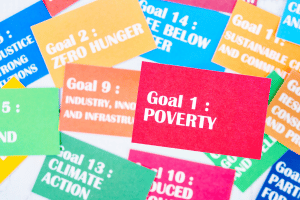In 2015, world leaders came together to address pressing global challenges by adopting the 2030 Agenda for Sustainable Development. Central to this agenda are the 17 Sustainable Development Goals (SDGs), a set of interconnected objectives to end poverty, protect the planet, and ensure prosperity for all. This foundational article aims to provide a comprehensive overview of each SDG, highlighting its significance and objectives in building a more sustainable future for humanity and the planet.
- Goal 1: No Poverty:
- Objective: To eradicate extreme poverty and ensure social protection for the poor and vulnerable.
- Importance: Poverty is a significant barrier to sustainable development, affecting access to education, healthcare, and fundamental human rights.
- Goal 2: Zero Hunger:
- Objective: To end hunger, achieve food security, improve nutrition, and promote sustainable agriculture.
- Importance: Hunger is a fundamental challenge that undermines human potential and threatens global stability.
- Goal 3: Good Health and Well-being:
- Objective: Ensure healthy lives and promote well-being for all ages.
- Importance: Access to healthcare and well-being is essential for individuals to thrive and contribute to society.
- Goal 4: Quality Education:
- Objective: Ensure inclusive and equitable quality education and promote lifelong learning opportunities for all.
- Importance: Education is critical to unlocking human potential and empowering individuals and communities.
- Goal 5: Gender Equality:
- Objective: Achieve gender equality and empower all women and girls.
- Importance: Gender equality is a fundamental human right and foundation for a peaceful, prosperous, and sustainable world.
- Goal 6: Clean Water and Sanitation:
- Objective: Ensure availability and sustainable management of water and sanitation for all.
- Importance: Clean water and sanitation access is crucial for health, dignity, and economic development.
- Goal 7: Affordable and Clean Energy:
- Objective: Ensure access to affordable, reliable, sustainable, and modern energy for all.
- Importance: Sustainable energy is essential for economic growth, environmental sustainability, and poverty eradication.
- Goal 8: Decent Work and Economic Growth:
- Objective: Promote sustained, inclusive, and sustainable economic growth, full and productive employment, and decent work for all.
- Importance: Decent work and economic growth are critical for reducing inequality and fostering sustainable development.
- Goal 9: Industry, Innovation, and Infrastructure:
- Objective: Build resilient infrastructure, promote inclusive and sustainable industrialization, and foster innovation.
- Importance: Infrastructure and innovation are critical economic growth and sustainable development drivers.
- Goal 10: Reduced Inequalities:
- Objective: Reduce inequality within and among countries.
- Importance: Inequality undermines social cohesion and economic growth, posing a threat to sustainable development.
- Goal 11: Sustainable Cities and Communities:
- Objective: Make cities and human settlements inclusive, safe, resilient, and sustainable.
- Importance: Urbanization presents opportunities and challenges for sustainable development, requiring effective planning and management.
- Goal 12: Responsible Consumption and Production:
- Objective: Ensure sustainable consumption and production patterns.
- Importance: Unsustainable consumption and production patterns strain natural resources and contribute to environmental degradation.
- Goal 13: Climate Action:
- Objective: Take urgent action to combat climate change and its impacts.
- Importance: Climate change poses one of the greatest threats to sustainable development, requiring global cooperation and decisive action.
- Goal 14: Life Below Water:
- Objective: Conserve and sustainably use the oceans, seas, and marine resources for sustainable development.
- Importance: Healthy oceans are vital for biodiversity, food security, and climate regulation.
- Goal 15: Life on Land:
- Objective: Protect, restore, and promote sustainable use of terrestrial ecosystems, sustainably manage forests, combat desertification, and halt and reverse land degradation and biodiversity loss.
- Importance: Terrestrial ecosystems are essential for biodiversity, climate regulation, and human well-being.
- Goal 16: Peace, Justice, and Strong Institutions:
- Objective: Promote peaceful and inclusive societies for sustainable development, provide access to justice for all, and build effective, accountable, and inclusive institutions at all levels.
- Importance: Peace, justice, and strong institutions are foundational for sustainable development and the protection of human rights.
- Goal 17: Partnerships for the Goals:
- Objective: Strengthen the means of implementation and revitalize the global partnership for sustainable development.
- Importance: Achieving the SDGs requires collaboration and partnerships among governments, businesses, civil society, and other stakeholders.
The 17 Sustainable Development Goals represent a universal call to action to address the world’s most pressing challenges and build a more sustainable, equitable, and prosperous future for all. By understanding the significance and objectives of each goal, individuals and organizations can contribute to collective efforts to achieve the SDGs by 2030. Through collaboration, innovation, and commitment, we can create a world where no one is left behind and the planet thrives for generations.


